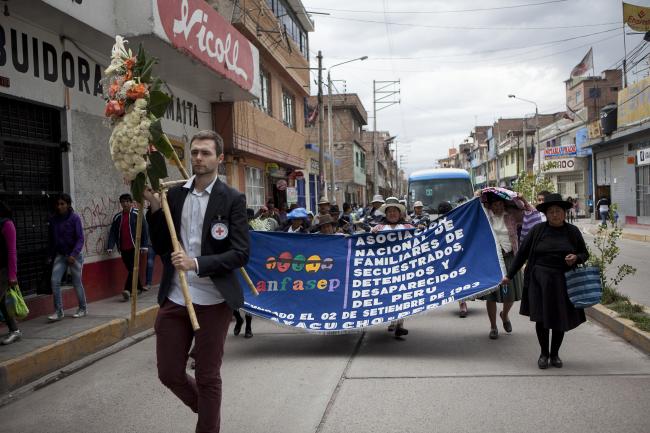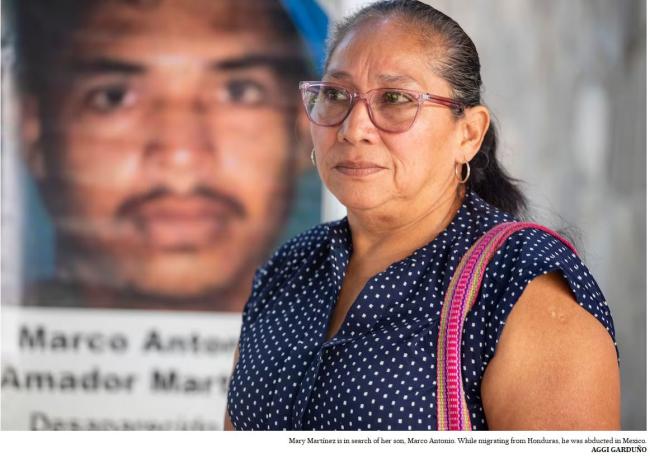Families of the missing as activists

Any reflection on the history of missing persons and of campaigns for the issue to be addressed reveals that families are at the very heart of such activism.
Any reflection on the history of missing persons and of campaigns for the issue to be addressed reveals that families are at the very heart of such activism. When loved ones of those who are missing make claims of the state, particularly when these concern disappearances perpetrated by the state, they do so as relatives of the missing. As a result, much of the knowledge we have about disappearance can be attributed to social movements – typically led by families of those disappeared – that have brought international attention to forced disappearance as a form of state violence.
Amina Zarrugh, in a recent academic journal article, sought to review the literature around such family-driven movements, to construct a sociology of them. She suggests that if we understand families as an essential part of such activism, it can enhance our understanding of these movements. Zarrugh shares several lessons concerning the significance of families as a driver of such social movements, including that: (1) families emerge as key actors in social movements against disappearance, because disappearance interferes with and disrupts the private lives of families economically, socially and emotionally; (2) the family is a strategic framework, especially in authoritarian settings, where other modes of organizing are limited; and (3) family-based movements are highly gendered, like families themselves, which creates unique opportunities to confront the state.
Disappearance as a violation explicitly seeks to target social connections, aiming to weaken political resistance to the repressive state by challenging familial bonds, as well as broader social relations and identities that are all destabilized by disappearance. Men are disproportionately disappeared, creating specific problems for families that are organized around a primary male breadwinner and resulting in women – notably the wives and mothers of the missing – being the most visible victims of disappearance. An example is a family-based movement in Jammu and Kashmir largely composed of what have become known as “half widows” – women in a liminal state of being unconfirmed widows. Movements centred on, and driven by, individuals who define themselves through their relationship to the missing are a natural response to the effort of the state to challenge – or even deny – that relationship. As a result, wherever people are disappeared, we see family-based movements seeking answers about the missing.
Strategically, the framework of “family” is a very powerful tool for social movements operating in authoritarian settings to contest human rights violations. This gendered division of labour within social movements echoes gendered social structures – in the family and beyond; this can be observed in particular in the mobilization of mothers in response to disappearance. The effectiveness of these “maternal movements”, as they are known, lies in their perception as both political – because motherhood is a valued status worthy of protection by the state – and apolitical – because women are generally framed as non-threatening and non-political actors. Repressing social activism by mothers can give such movements a strategic advantage, making such action more challenging for authoritarian states than dealing with movements of younger, male activists.
One sensitive issue such groups must consider is the extent to which they see human rights as the basis of the claims they are making of the state. Globally, what brings families of the missing together is their shared suffering, but in some contexts, such as Latin America, the human rights framework is important. Furthermore, all social movements are built on shared understandings of identity, and it is the identity as a suffering family member that defines activism around the issue of missing persons. Where a movement is framed as family members of the disappeared who are seeking an answer concerning the fate of their loved ones, rather than making broad human rights claims, it can be less threatening to the state and so enjoy greater freedom of action. Of course, identity is highly contextual, as illustrated in the Libyan context and the search for answers by a social movement there about men forcibly disappeared in the 1980s and 1990s. It refers to itself as a family movement but uses an Arabic term for family that literally means “clan” or “community”, thus attributing the broadest possible meaning to it allowed by the language. As well as describing the engagement of mothers, fathers, wives and siblings of the disappeared, it encompasses the activism of their children, nieces, nephews and grandchildren – all of whom have publicly protested in Benghazi since 2007.
These reflections suggest that the family can be an important “weapon of the weak” for communities devastated by disappearance and who have few other routes to confront the state. The prevalence of family movements in authoritarian contexts suggests that the family may be one of very few mechanisms that can be used to their advantage by people on the margins of a political community. This is evident in the mobilization of families of migrants who go missing on their migration journeys and who are typically ignored by the state, and in the movements among mothers in Central America, such as Caravana de Madres de Migrantes Desaparecidos (Caravan of Mothers of Missing Migrants). Evidence suggests that such movements are likely to emerge in contexts where individuals are denied full membership of a political and social community and so turn to family as a trusted, reliable instrument for challenging the state.
An understanding of how the family across cultures and geographies is engaged through using activism to address disappearance (and the issue of those who go missing in migration and other contexts) can help increase the effectiveness of such activism.
Author: Simon Robins



